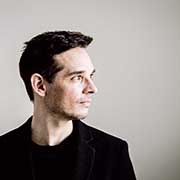Miroslav Srnka has composed a concerto for the harpsichordist Mahan Esfahani and the Gürzenich-Orchester Cologne. François-Xavier Roth conducts the world premiere of "Standstill" on 11 September in Cologne. Three questions on his new work to the composer.
You’ve already worked with Mahan Esfahani at the “Dialogues” Festival in Salzburg, and written the work “Triggering” for him, premiered at the Czech “contempuls” Festival. What does this instrument have, what can it do, especially with this performer, which other instruments can’t?
The harpsichord is one of the most difficult instruments to compose for: the pitch and duration of the notes are so to the fore that every compositional weakness is exposed even more starkly. This teaches me not to underestimate these fundamentals and to redefine them anew. In Triggering I learned to approach the absence of dynamics and a flowing change of colour quite differently. Now I have attempted to expand the concept from a sound impulse as a “trigger” into an orchestral structure. Mahan is a musician with a highly developed understanding of time in musical interpretation. This seems to be unique to me amongst interpreters of contemporary music. Combined with his political and cross-cultural understanding, this offers one of the most inspiring amalgams for a composer.
You’re writing a short work for the Mahler Competition in Bamberg, so the premiere will be given by very young conductors. What can young performers do which older ones can’t?
A few years ago I wrote Emojis, Likes and Ringtones as a test piece for the ARD Music Competition in the piano trio category. That was one of the most pleasing experiences I have had to date. On the day of its premiere, I was able to hear a whole series of interpretations of this piece. In the process, you learn so much about your own music. On a summer course last year, I then used the recordings of the Emojis for a seminar for young composers about the question of what interpretation is, and what a score can convey. The commitment you get from young musicians is unique. Equally superb was my experience with a composition for the ECHO Rising Star Simon Höfele, who has been touring the top concert halls in Europe this season with Milky Way.
What can a short piece achieve which something longer can’t?
You learn even better to work according to the saying of Antoine de Saint-Exupéry: “Il semble que la perfection soit atteinte non quand il n‘y a plus rien à ajouter, mais quand il n‘y a plus rien à retrancher.” – “It seems that perfection is achieved not when there is nothing more to add, but when there is nothing more to take away.”
(from [t]akte 1/2020 – translation: Elizabeth Robinson)



